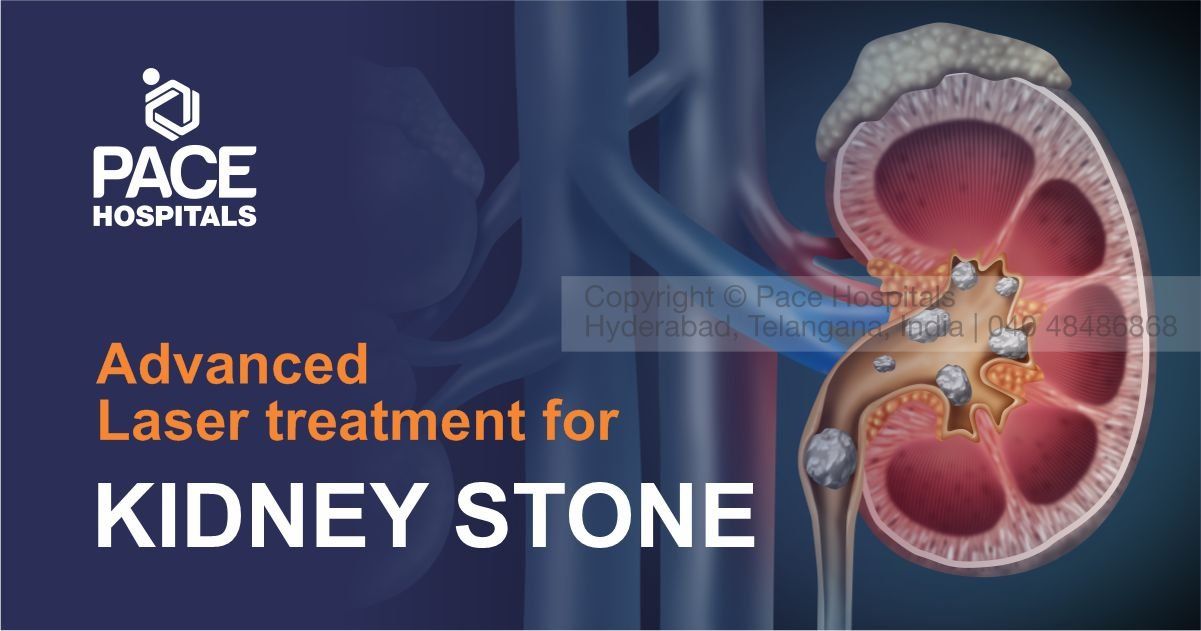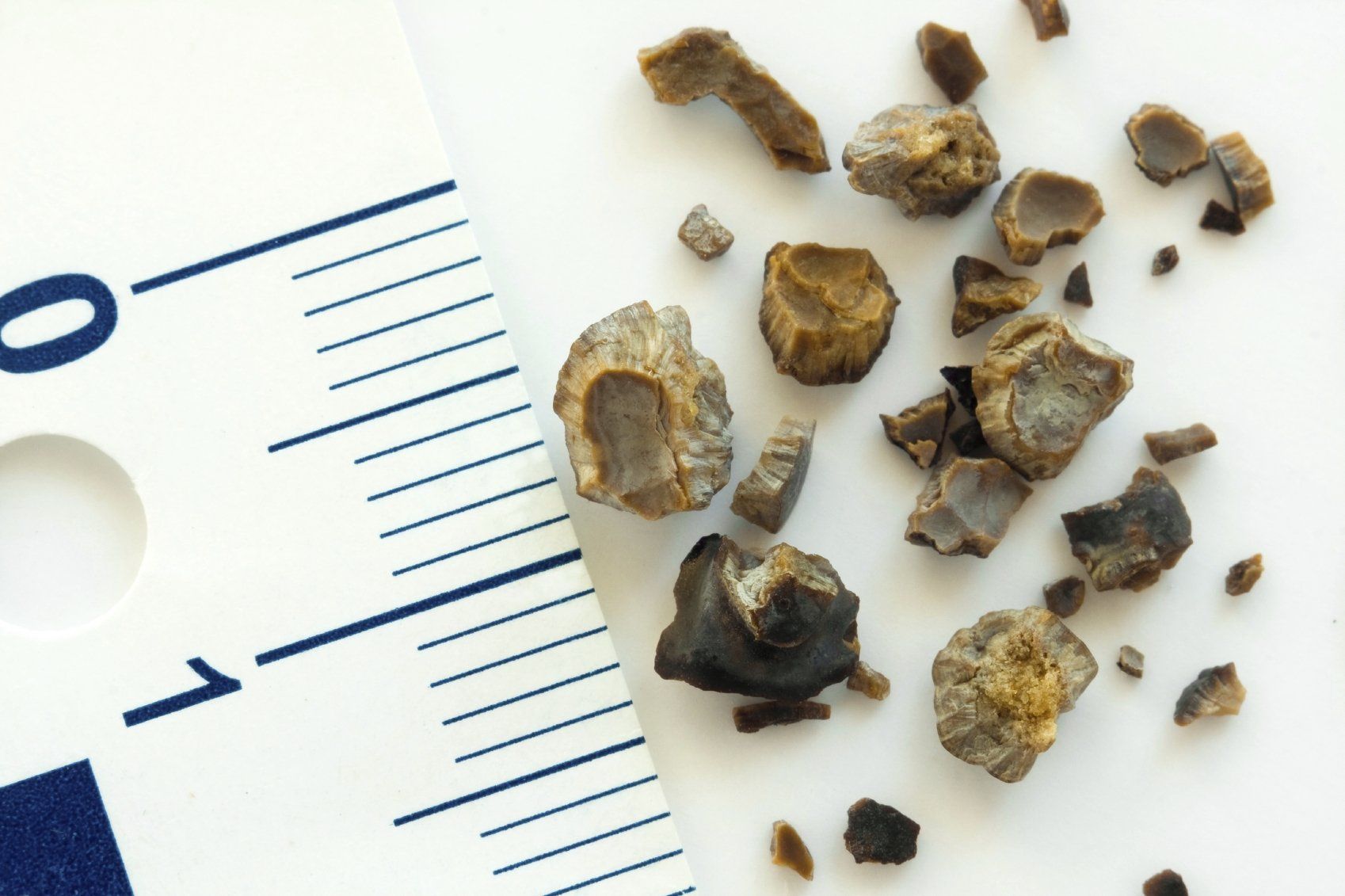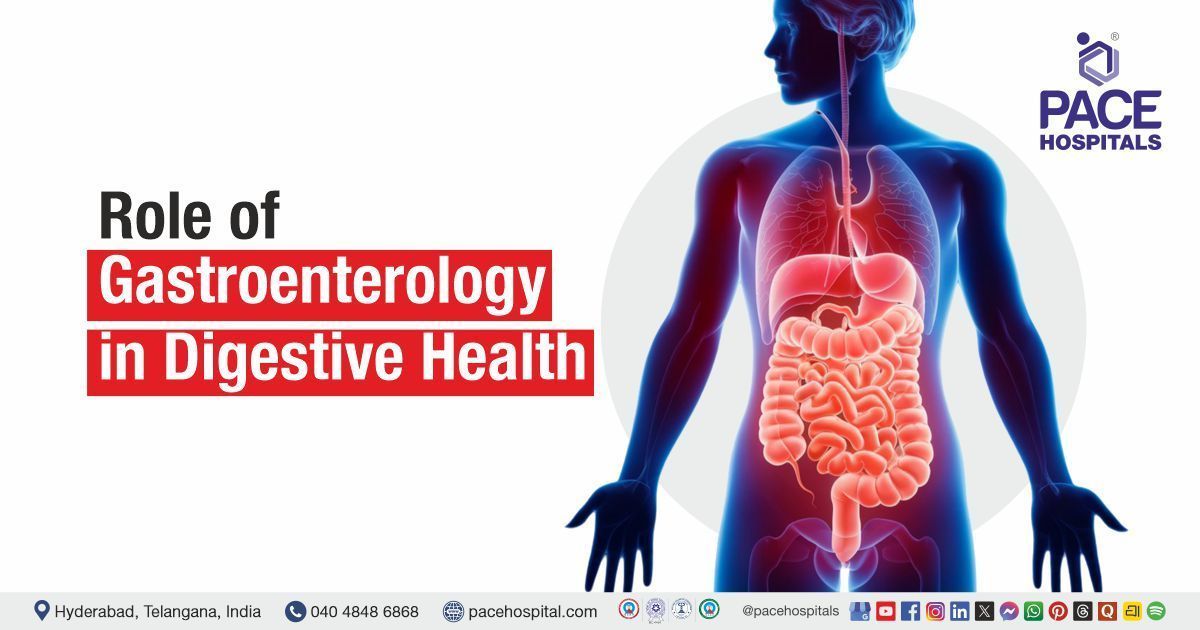What are Kidney Stones and What are the options for kidney stones treatment?
PACE Hospitals
Kidney stones treatment using Laser was also found to be effective for removing both large and small kidney stones with over 95.8% success rate in most patients.
Urine normally contains chemicals that prevent the crystals from forming. However, if crystals do form, often they remain small enough that they can travel through the urinary tract and pass out of the body unnoticed.
When crystals aggregate or grow into a larger mass they form a different
types of kidney stones such as Calcium Oxalate Stones, Calcium Phosphate Stones, Struvite stones, Uric acid stones, Cystine stones, the stone can continue to grow, or move and become stuck in the tubes that drain urine from the kidney to the bladder (ureter) can blocks the flow. Larger stones may become lodged in the urinary tract and cause obstruction, with severe pain and cramping; blood in the urine; pain; or infection.
What are the causes for Kidney Stone Causes?
More than 90 percent of people with kidney stones have a chemical abnormality of blood or urine that contributes to the tendency to form the stones. Not drinking enough water, consuming more animal protein such as poultry, red meat, eggs and seafood, other fluids, family history, medical conditions such as renal tubular acidosis, cystinuria, hyperparathyroidism and repeated urinary tract infections also may contribute to the risk of kidney stones . Inadequate fluid intake causes the kidneys to produce less urine as well as urine that is highly concentrated. The smaller the daily volume of urine, the more likely it is that a person will form kidney stones. This is especially true if a person has one of the previously mentioned chemical abnormalities.
What are the symptoms of Kidney Stone?
The most common symptoms of kidney stones are back or abdominal pain, or blood in the urine or urinary tract infections. The severity and location of the pain may vary depending on such factors as stone location and degree of obstruction whenever stone passes. Other symptoms include:
- Feeling the need to urinate often
- Nausea
- Vomiting
- Cloudy, foul smelling urine
- fever, chills or weakness may all be signs of a serious infection.
Some kidney stones are called “silent stones” because they do not cause any symptoms.
How are kidney stones diagnosed?
If symptoms are present, urologist may ask Blood test, X-rays, CT Scan or an ultrasound examination of the kidneys, ureters and bladder. A urine test may be used to find very small kidney stones in the urine. The urine is strained and any stones found are analyzed to determine their chemical composition.
What are the options for kidney stone treatment?
Observation and stone passage
In many cases, a person can pass the stone through urination. This may be a painful process that can take a couple of days or more. A physician may prescribe pain relievers and medication to relax the ureter. The patient will be asked to strain the urine and save the stone so that it can be analyzed. The likelihood of stone passage depends on the size and location of the stone. For example, a 5-mm stone will have about a 60 percent chance of being passed if a medication to relax the ureter is prescribed. However, on average, this would take two weeks.
Minimally invasive interventions
When a person cannot pass a kidney stone through the urine, there are minimally invasive treatments available:
- Ureteroscopy:This outpatient procedure involves inserting a small instrument called a ureteroscope through the urethra (the tube through which a person passes urine from the body) and up the ureter to visualize the stone. The stone is then fragmented with a laser and the fragments may be retrieved with a basket. A ureteral stent is often left for one week after this procedure. The main risk is possibility of injury to the ureter. A major injury occurs in one out of 1,000 procedures. This procedure may be used for stones up to 2 cm in diameter in any part of the urinary tract.
- Shock wave lithotripsy (SWL): SWL is a noninvasive technology that allows urologists, using a specialized table, to focus waterborne shock waves through a localized area of the body and on the kidney stones to disintegrate them. The stones are broken into small particles, which can then be passed through urination. The procedure takes approximately one hour and patients are generally discharged from the hospital a few hours after the treatment. Factors such as stone size and location, the hardness and number of stones, the patient’s height and weight, and pregnancy must be considered prior to choosing this procedure.
- Percutaneous nephrolithotomy (PCNL): PCNL is a minimally invasive surgical procedure used for stones larger than 1.5 cm. A 1-cm incision (about 1/2 inch) is made in the patient’s back to get direct access into the kidney for stone removal. The patient is kept overnight for recovery. This procedure offers the highest success rates for kidney stone removal.
Kidney Stone Laser Treatment
The advantage of Kidney stone laser treatment -
- Laser treatment for kidney stones can be used for treating different stones that have different compositions.
- Laser treatment for kidney stones is less invasive and is associated with faster recovery time compared to shockwave lithotripsy or percutaneous nephrolithotomy.
- Kidney stone laser treatment with the Holmium YAG laser is well researched and has shown excellent results that are equal to shockwave lithotripsy.
- The laser treatment for kidney stones was found to have lower complications, lower risk of stone recurrence as well quicker patient recovery times.
- Kidney stone laser treatment was also found to be effective for removing both large and small kidney stones.
- Laser treatment for kidney stones was over 95.8% success rate in most patients.
- More interestingly, when patients received a kidney stone laser treatment, the stone re-treatment was almost 5 to 6 times lower as compared to other treatment options.
Laser treatment for kidney stones is better procedure when compared to other kidney stone removal treatment options.
Is it safe to take painkillers during kidney stone treatment?
All patients cannot be given blanket advice on this to use painkillers. We have two to three different types like non-steroidal anti-inflammatory painkillers, steroidal painkillers and even morphine painkillers. So those patients who have comorbidities like diabetes or chronic kidney diseases, or with some altered renal function, they are not supposed to use non-steroidal anti-inflammatory painkillers even for short period or for long period, these are to be avoided in patients with kidney alter renal function test, so here we need to use other forms of painkillers.
Definitely, any normal person without any much altered renal function can safely use painkillers for temporary relief of the kidney stone problem. Based on the size of the stone and where it is located, the final treatment has to be decided, so painkiller is not a final solution to all kinds of kidney stone.
Share on
Request an appointment
Fill in the appointment form or call us instantly to book a confirmed appointment with our super specialist at 04048486868












